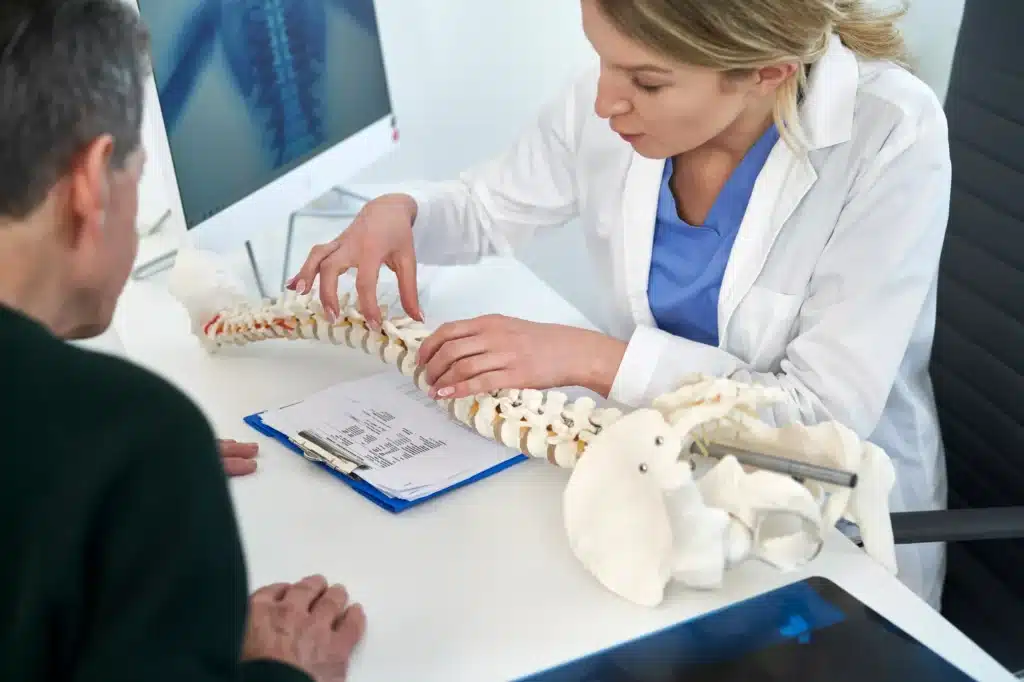
Table of Contents
ToggleNerve compression can be a debilitating condition that affects many people. While the cause is unknown, it can be treated with spine surgery to remove the nerve compression and restore normal nerve function.
Treatment options include decompression surgery and fusion surgery. Decompression surgery removes the compressing tumor or disc material from the spinal canal and adjacent areas.
Fusion surgery fuses two vertebrae together with a bone graft to relieve pressure on the nerve root(s).
Nerve compression is a condition that occurs when pressure is put on a nerve. This can happen as a result of herniated discs, bone spurs, and infections.
In the case of herniated discs and bone spurs, the spinal canal narrows due to disc material pressing against it from within or soft tissues growing around its edges from outside.
When this happens, nerves are compressed and may become inflamed or damaged if they remain compressed for an extended period of time (more than six months).
Nerves carry messages between your brain and body parts such as arms/legs or face/lips – so when they’re compressed by something like bulging disc material or bone spurs, those messages don’t get delivered properly which causes pain!

Nerve compression can cause a variety of symptoms. Typically, you’ll experience numbness, tingling and pain in the area where your nerve is being compressed.
The pain may be constant or intermittent and can be characterized as sharp or dull. If you have severe nerve compression, you may even experience muscle weakness in the affected limb.
If it’s not treated properly, this condition could lead to chronic pain syndrome–a condition where you suffer from persistent everyday discomfort that interferes with your ability to work and live normally.
The most common causes of nerve compression are degenerative disc disease, herniated disc, spinal stenosis and scoliosis.
Other conditions that can contribute to nerve compression include kyphosis or lordosis (forward curvature of the spine), spondylolisthesis (slippage of one vertebrae over another) and spinal tumors.
Nerve compression may also be caused by infection or trauma to the spine.

If you have been diagnosed with nerve compression, talk to your doctor about options for treatment. Your doctor will be able to help you weigh the risks and benefits of each option.
You may also want to ask how much each procedure will cost, as well as how successful they’ve been in similar cases of nerve compression.
Spine surgery for nerve compression needs to be done by a skilled surgeon. The procedure requires specialized training and experience, as well as a good deal of confidence in the surgeon’s skills and qualifications.
If you are considering spine surgery for nerve compression, it is important that you choose your doctor carefully–and don’t be afraid to ask questions!
In conclusion, nerve compression is a serious condition that can cause a range of symptoms and can greatly impact a person’s quality of life.
Seeking help as soon as possible is key to achieving a good outcome. Spine surgery, such as a discectomy or joint surgery, may be recommended to relieve the pressure on affected nerves.
Remember, early intervention is crucial in managing nerve compression and minimizing the potential for long-term damage.
GET IN TOUCH +
285 Sills Road
Building 5-6, Suite E
East Patchogue, NY 11772
(631) 475-5511
184 N. Belle Mead Road
East Setauket, NY 11733
(631) 675-6226
GET IN TOUCH +
285 Sills Road
Building 5-6, Suite E
East Patchogue, NY 11772
(631) 475-5511
184 N. Belle Mead Road
East Setauket, NY 11733
(631) 675-6226
SUBSCRIBE TO OUR NEWSLETTER +
Send us a Google review. Click this link and let us know how we did!
Review us on Yelp too.